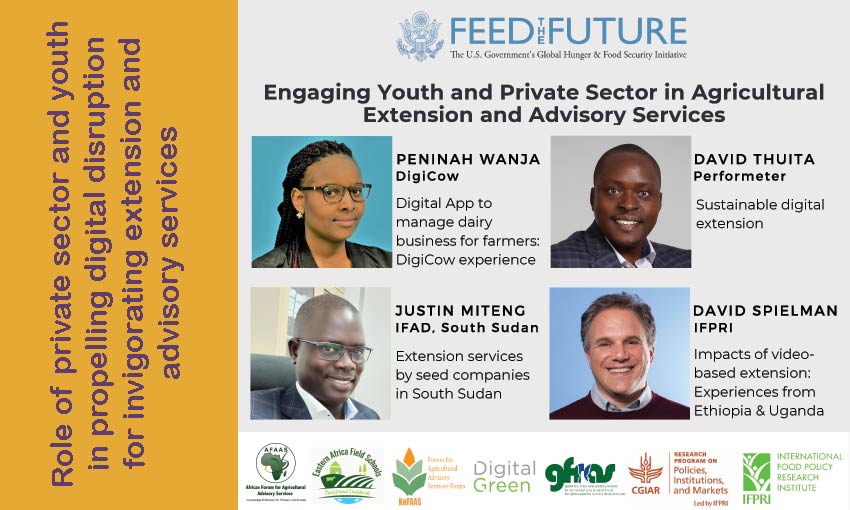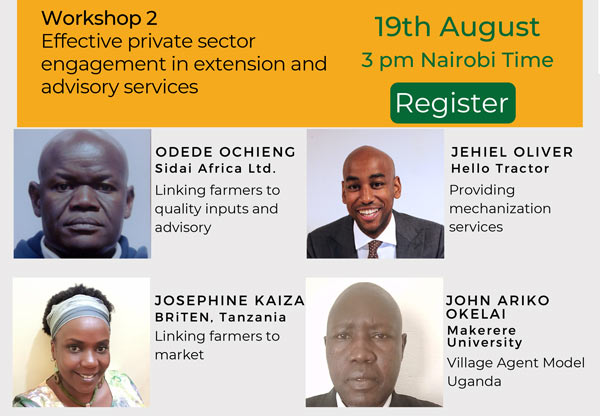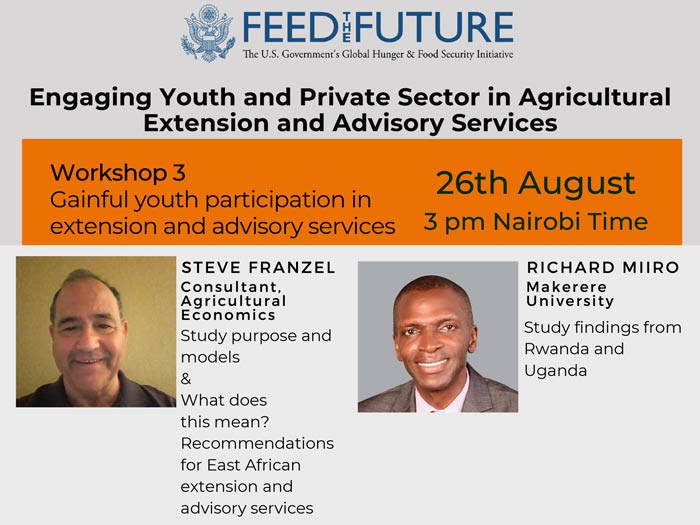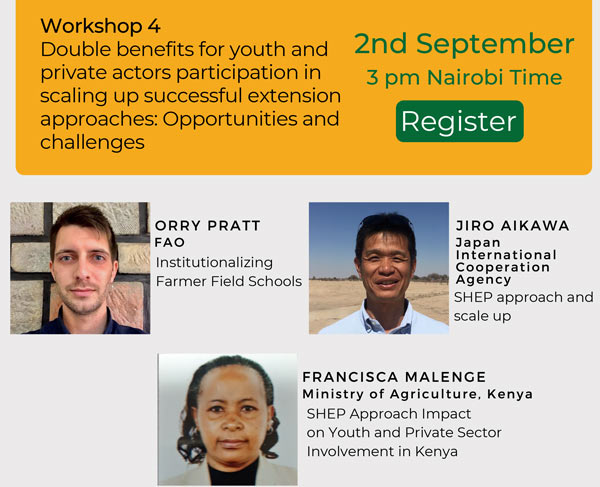East Africa Community of Practice Knowledge Sharing Event

Background
Agricultural extension and advisory services are critical for agricultural development. They provide mechanisms for information and knowledge exchange and human capital development on management practices, technologies and innovations along agricultural value chains. This reduces uncertainties facilitating appropriate decisions with optimal returns, leading to enhanced agricultural performance. Technology and innovation harnessing toward improved extension and advisory services contribute significantly to the realization of continental and global development blueprints such as African Union’s Agenda 2063 and the Sustainable Development Goals. However, multiple challenges characterize extension, curtailing its role in transforming East African agriculture. Nevertheless, opportunities to reinvigorate and rethink extension and advisory services in the wake of new challenges such as locusts invasions, climate change and the COVID-19 pandemic are multiple and promising.
Objectives
To interrogate the state of extension systems in East Africa and devise mechanisms to take advantage of existing opportunities, the Feed the Future Developing Local Extension Capacity (DLEC) Project in collaboration with the African Forum for Agricultural Advisory Services (AFAAS), Eastern Africa Field Schools Support Hub and Forum for Agricultural Advisory Services – Kenya (KeFAAS) are organizing an online community of practice event on ‘Engaging youth and the private sector in extension and agricultural advisory services.’ The event will bring together experts, practitioners, researchers and funding partners to share, discuss and learn about issues of extension and advisory services in East Africa. The key messages and lessons will be documented into policy briefs that will be shared with East Africa policymakers to inform the extension policy agenda.
The event is comprised of four thematic sessions:
1 – Role of private sector and youth in propelling digital disruption in invigorating extension and advisory services (5th August, 2020)
2 – Effective private sector engagement in extension and advisory services (19th August, 2020)
3 – Gainful youth participation in extension and advisory services (26th August, 2020)
4 – Double benefits for youth and private actor participation in scaling up successful extension approaches: Opportunities and challenges (2nd September, 2020)
1. Digital disruption opportunities in invigorating extension and advisory services
There is growing evidence on how digital disruptions could transform agriculture service provision including extension. Digitally-enabled advisory services could significantly change its delivery in Africa, facilitating extensive and timely information delivery. In the wake of the COVID-19 pandemic, digital platforms have taken a critical role in facilitating information, goods and service delivery. It is thus imperative that digitally-enabled extension and advisory services become the norm in future. Past efforts have seen youth and private actors successfully develop digitally-enabled services. This session will therefore feature successful youth and private sector led digital extension through an interactive panel discussion with experts and breakout sessions to facilitate reflections, interrogations and further discussions. As such, lessons will be drawn to consolidate opportunities for gainful uptake and scale-up.
Click to see the videos and presentations.
2. Effective private sector engagement in extension and advisory services
Several countries in Africa have adopted pluralistic extension service delivery. Involvement of private advisory service providers in part addressed the dwindling public extension workers. Nonetheless, pluralism brings issues regarding quality and professionalism of provision. The webinar will focus on showcasing successful private sector led extension services, ascertain the potential for public-private partnerships and initiate policy dialogue on effective private sector engagement in extension.
Click to see the videos and presentations.
3. Gainful youth participation in extension and advisory services
Youth present an opportunity toward addressing the extension and advisory services capacity gap. On the one hand, youth should be targeted as clientele of extension; on the other, as providers. Compared to other continents, Africa has the highest youthful population globally, a situation that is not likely to change in the next decades. In Africa the majority of this young population remains unemployed. With agriculture as the largest employer spurring African economies, positioning youth to take up critical roles in the agriculture sector (as producers or providers of advisory services) is critical. This session will feature a study by DLEC on youth engagement in private sector extension and advisory services which will lay the foundation for the discussions. In addition, other innovative youth in extension models will be presented. The session will conclude with a policy discourse to facilitate youth transition into agriculture.
Click to see the videos and presentations.
4. Double benefits for youth and private actor participation in scaling up successful extension approaches and scale up: Opportunities and challenges
Different extension approaches have been developed and tested. Among these approaches include farmer field schools (FFS) and Smallholder Horticulture Empowerment and Production (SHEP) approach. Their success is largely pegged on among other factors, such as how they have assimilated youth and private actors as agents and participants or beneficiaries. Their integration is critical in scaling up these approaches. This webinar will explore the double benefit for youth and private actors’ involvement in FFS and SHEP as well as challenges that may hinder successful integration with the aim of aligning these approaches to realize wider-scale impact in agriculture development.
Click to see the videos and presentations
For more information:
Kristin Davis | |
Max Oluput | |
Henry Kinyua | |
Peter Mwangi | |
Mercy Mburu | |
Silvia Mburugu |




